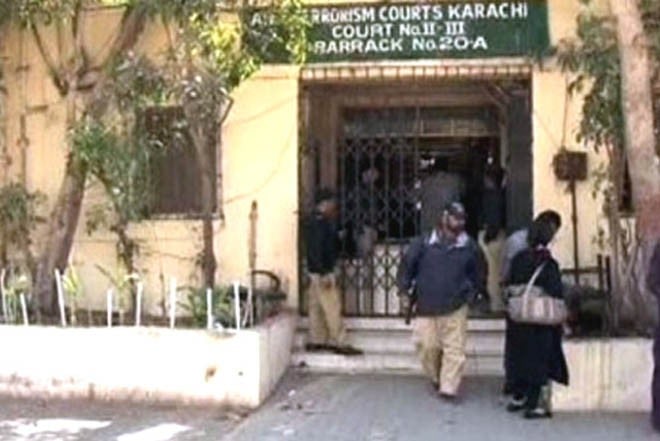
Vague definition, incompetent police system, and absence of flawless witness protection are big hurdles in achieving results

The act of creating terror in public has been described as an act of terrorism, according to Anti-terrorism Act 1997. The interpretation of this wide-ranging term is in the hands of police officers from the lower ranks, who are vulnerable to corruption and political pressure.
Zulfikar Ali Bhutto enacted anti-terrorism law, Suppression of Terrorist Activities Ordinance 1975, which remained operational in Sindh and Punjab provinces till 1997. The January bombing in 1997 in Lahore Session Courts compelled the government to legislate Anti-Terrorism Act (ATA) 1997, a stricter law for curbing terrorism.
Primarily, the ordinance of 1975 and ATA were designed to handle sectarian violence and terrorism. However, the rest of the offences were brought under ATA later.
More than 90 per cent of violent offences come under ATA, which means the definition of terrorism is very vague. Even the signatory of ATA 1997, the then Prime Minister Nawaz Sharif, was also convicted under this act and sentenced for life imprisonment in the year 2000.
Section 6 and 7 of Anti-Terrorist Act 1997 say that any act which creates insecurity or threat to people or a section of people by using explosives, any kind of bombs, fire-arms, poison, chemicals, or noxious gases, in such a manner to cause or to be likely to cause the death or injury to any person or persons, will be charged under this law.
Kidnapping for ransom, murder, damage to public property, any act against armed forces, civil armed forces, civil servants, or to threaten them are the offences that come under this act.
The fact is that most of the aforementioned amendments and a wide-ranging definition of terrorism in ATA have been taken from the UK’s Terrorism Act, and while copying we couldn’t transmute this law according to our national and regional requirements.
Thousands of cases are pending in Anti-Terrorism Courts (ATCs) in the country. Sindh province comes first in the regard. More than five thousand cases were awaiting their logical conclusion till the end of 2017. This was confirmed by the provincial law minister, Zia ul Hasan, in a media briefing. The status of some of the cases in different parts of the country remain unchanged for the last eight years, which were supposed to be disposed of in ninety days.
"ATCs have no work load and I don’t believe in any kind of backlog as such in these courts," says Aftab Bajwa, former secretary Supreme Court Bar. "In fact, unprofessional attitude of the prosecution and dishonest police force are prime reasons behind cases pending in courts. Prosecutors neither have any experience to handle such cases, nor do they have proper knowledge regarding the importance of evidences. They must have proper training and understanding of the law of evidence (Qanoon-e-Shahadat 1984) and its ambiguities."
"Seriousness and commitment is required to resolve problems," says deputy prosecutor general Punjab. "Imposing a new system rather than uprooting the causes of a faulty or incompetent structure looks absurd. The ATCs would have been better in giving speedy justice if the list of terrorism offences was correctly structured and the session courts had performed well," he adds.
"Session courts have nothing to do with ATCs," says Badar uz Zaman Chatha, former district and session judge.
Vague definition of terrorism in ATA has also provided an opportunity to people to register an FIR against their opponents carrying offences of terrorism.
Ambiguities in the unreliable investigations of the police and lack of evidence provide a chance to suspected terrorists to earn freedom or the courts have to refer these cases to session courts, which ultimately increase the burden of the courts.
The Supreme Court has been passing orders to reduce the list of offences incorporated in the ATA. A 22-page verdict given by a three-judge Supreme Court bench headed by Justice Dost Mohammad Khan in August 2017 says, "Even though ordinary crimes can have a devastating, gruesome and heart-rending effect on human beings, this by itself should not be reason enough to bring the crime within the fold of terrorism or to attract the provisions of sections 6 and 7 of the ATA (Anti-terrorism Act 1997)".
The Supreme Court has also passed orders saying that a murder committed on the basis of personal grudges must not be registered under ATA. According to the judgment, the police is supposed to get legal opinion before registering such cases.
"The absence of protection system for judges, prosecutors, lawyers and witnesses is vital in the performance of ATCs," says Ansar Manzoor Shah, advocate high court. "To find any independent witness in such cases is a gargantuan task to achieve, therefore, police is either unable to present witnesses in these cases or they try to bring fake ones, which ultimately destroys the whole case."
Strong religious elements is another aspect to be considered in this regard. "Few prosecutors, lawyers, or even judges can face such a great level of threat that is why the conviction rate of ATCs is very low in comparison to the Army courts," according to Manzoor.
ATA is to cater for hardcore terrorism but the lacunas of vague definition, incompetent and vulnerable police system, non-professional and under-trained prosecutors, and absence of flawless protection system are big hurdles in achieving speedy but flawless results through ATCs.